 The
VigilanceVoice
The
VigilanceVoice
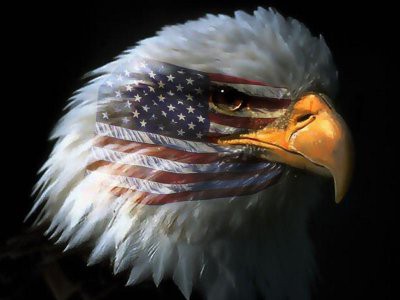
VigilanceVoice.com
Saturday-- June 8,
2002—Ground Zero Plus 269
Blood On A Leaf
by
Cliff McKenzie
Editor, New York City Combat Correspondent News
GROUND ZERO, New York City,
June 8--The story in the New York Times this morning about
construction workers at Ground Zero finding a new cache of body parts in a
building adjacent to the World Trade Center startled me.
On May 30, I walked in tribute at the Ground Zero
closing ceremonies with the families of those who had been confirmed dead
or missing during the September 11th Terrorist attack
Officially, the search and rescue
operations ended that day.
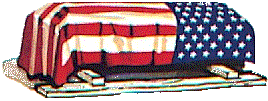 Symbolically, the last "body" was carried out of the Ground Zero pit to
sound of Taps, put in an ambulance and driven slowly up West Street
through an honor guard of firemen, police and rescue workers who, for the
past nearly nine months, had dug and raked through millions of tons of
dirt and debris to find any remaining signs of the missing.
Symbolically, the last "body" was carried out of the Ground Zero pit to
sound of Taps, put in an ambulance and driven slowly up West Street
through an honor guard of firemen, police and rescue workers who, for the
past nearly nine months, had dug and raked through millions of tons of
dirt and debris to find any remaining signs of the missing.
Of the 2823 people presumed confirmed dead
in the attack, only 1,058 have been identified as of May 30. I
thought perhaps the ceremony might offer me some closure, some suturing of
the wounds of that horrible day when I witnessed bodies leaping from
windows, and shuddered as the buildings collapsed and washed us all in a
deathly pall I was sure contained bio-chemical agents.
I hoped the ceremonies would end my constant reminder
of the devastation of war. The door to my memories of Vietnam
had never been shut. I thought participating in closure ceremonies
on May 30 might offer some reprieve from both old and new war scars.
I was wrong.
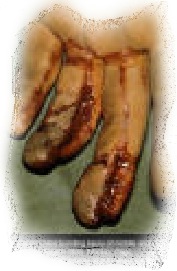 This morning's Times article talked about finding fingers in the
building's rain gutter, and jaw bones with teeth intact in the guts of
building. The body parts were found in a bank building adjacent to
the World Trade Center. It hadn't been searched because primary
attention was given to Ground Zero soil. After rescue operations
ceased, construction workers began to dismantle the wounded building.
Inside, they found found parts of the airplane--seats and baggage
containers--as well as human remains scattered everywhere.
This morning's Times article talked about finding fingers in the
building's rain gutter, and jaw bones with teeth intact in the guts of
building. The body parts were found in a bank building adjacent to
the World Trade Center. It hadn't been searched because primary
attention was given to Ground Zero soil. After rescue operations
ceased, construction workers began to dismantle the wounded building.
Inside, they found found parts of the airplane--seats and baggage
containers--as well as human remains scattered everywhere.
My stomach turned as I read the story.
It was like Promethius opening Pandora's Box again. I saw the horror of
the past come to life. This time it was more vivid, more
disturbing because my Vigilance guard was down. After May 30, I
lowered my emotional shields. I cried that day when Taps was
played. I had never cried before for war victims, or my part in war. I
did that day.
The Times story sobered me to the reality that death
and destruction always lingers, constantly fertilizes the present with its
acrid scent of decaying flesh locked in my memory cells. I had hoped
the Closing Ceremonies washed such memories clean.
But the article resurrected the stench within.
It triggered ancient memories of Terrorism I
prefer not to embrace. They were of a time three-and-a-half
decades ago when I was a young warrior in the Marine Corps,
 marching
through the rice paddies of Vietnam on one of many "search and
destroy" missions.
marching
through the rice paddies of Vietnam on one of many "search and
destroy" missions.
It brought back the vivid memory of a bloody leaf.
In early 1966 we were hunting
North Vietnamese regulars--the toughest of all enemies one could face in
Vietnam. They were regimented warriors, not hit-and-run specialists
like the Viet Cong. They stood their ground and fought to the death,
taking as many of us with them as possible.
They ambushed us, pinning us down in a rice
paddy. We crawled into our helmets, using any tiny precipice of a paddy dike
for cover, waiting to die as the crossfire laced a network of lead inches
above our heads and making it impossible to assault without instantly being
cut in half.
We lay in the muck and lifted our rifles up
blindly and fired, not daring to raise our heads into the killing zone to
take aim. We radioed for air support, hoping our Marine close air
support would swoop down and surgically drop napalm or bombs on the enemy
and not us. The North Vietnamese were so close you could smell the foul
odor of their fish oil saturating the bags of rice they feasted upon so
they could kill us on full stomachs.
Finally, the planes screamed down.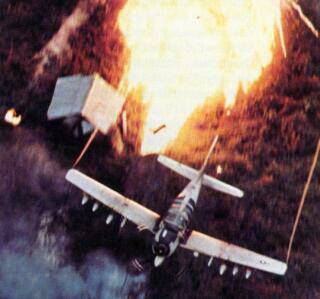 The heat of the napalm scorched us. We buried our faces in the dirty paddy
water praying the jet jockeys didn't miss their targets and light us up.
Then we assaulted.
The heat of the napalm scorched us. We buried our faces in the dirty paddy
water praying the jet jockeys didn't miss their targets and light us up.
Then we assaulted.
A few of the Vietnamese warriors survived. They
injected themselves with heroin or opium, and tied their hands to the
grips of their machine guns. Some were literally cut in half but
still firing, the drug easing the pain of death as their fingers twitched
on the triggers, taking as many of us out before the final drops of their
blood drained into the soil.
In the end it wasn't a victory. No one cheered as
we waded through the charred bodies, searching for any lingering life,
wary of snipers tied into trees. The snipers protected the
retreating enemy. They tied themselves to the trees so if they were wounded they wouldn't
fall and could squeeze off final rounds before we blew the tree and their
remaining bodies to kingdom come. They died honorable warriors.
Some battles end in reverent silence. When
warriors fight fiercely to the death it seems there is no jubilation on
the victor's side--just a gladness it is over prevails--an ecclesiastical resignation to
the end of one more conflict that only signals a momentary respite before
the next one begins. The threat of death never leaves the combat
zone except after a battle when you realize how lucky you were to still be
alive.
As Marines, we respected the North Vietnamese's fighting
will.
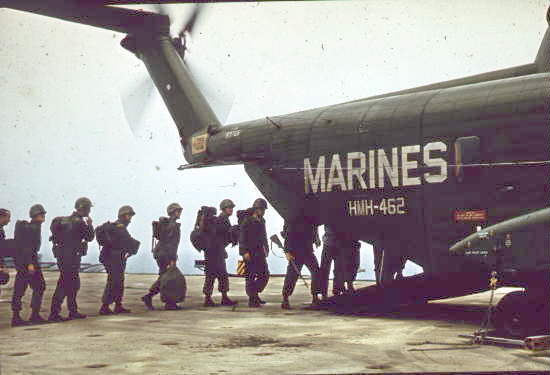
 They
were as tough as we, as dedicated, as brave and and courageous toward
their goals of winning, of inflicting the greatest pain and suffering upon
their enemy.
They
were as tough as we, as dedicated, as brave and and courageous toward
their goals of winning, of inflicting the greatest pain and suffering upon
their enemy.
That's why we walked through the body count in respect.
Man-for-man, they were our brothers in blood. We all knew that.
We didn't cheer at their defeat. In another time, another place, under
different circumstances, we might have fought on the same side.
Ideology separated us, but we were equals in Courage, Bravery and
Conviction. Our parallel willingness to die made us blood brothers.
After mopping up, we
left the battlefield and moved on, continuing our sweep.
A few months later we were on patrol in the same
sector. I had forgotten about the battle in the rice paddy
until we came upon the scene.
It was a bright sunny day. Life was
peaceful. The rice shoots were standing tall above the water.
Silvery spots danced on the surface as the wind tickled the water, causing
the sun's reflection to create a shimmer.. Clumps of white
clouds lazed overhead and the bright green verdant view of the Vietnam
landscape framed the scene into a soft watercolor that might have rivaled
any travel poster.
We took a break at the spot.
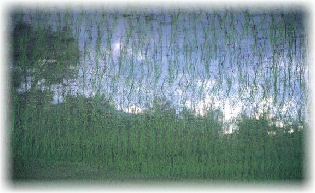 I began to search for battle signs--perhaps
a shell casing, or a used compress, a helmet, some artifact that might
denote we had been here turning the rice paddy water red with our blood.
The battle area had been picked clean either by the farmers who wanted
their land returned to its original state, or by the Viet Cong who used
anything and everything left behind.
I began to search for battle signs--perhaps
a shell casing, or a used compress, a helmet, some artifact that might
denote we had been here turning the rice paddy water red with our blood.
The battle area had been picked clean either by the farmers who wanted
their land returned to its original state, or by the Viet Cong who used
anything and everything left behind.
Tired, sweaty and empty handed
I sat down next to a paddy dike. I removed my helmet and
leaned back against the slope of a small mound of dirt. That's
when I saw it--my artifact--the bloody leaf.
At first I didn't recognize the rusty color
clinging to the bright green "V"-shaped leaf that arched upwards from a
long stem and appeared to be sunning itself. I slipped
my finger under the leaf and lifted it slightly, religiously, to inspect
it more closely.
The dried blood had survived; it was now
part of the leaf. I sat for a few moments staring at it. I
wondered whose it was--ours or theirs? I wondered how old the owner
of it had been? I wondered about his friends, mother, father, wife,
children, brothers, sisters, cousins, uncles?
brothers, sisters, cousins, uncles?
I touched the dried, caked surface where
the blood had been embossed into leaf's veins, as though hoping to dial up
some mysterious spiritual station that might lead me to its owner's life,
to see who he was, what he was like. There was something
special about touching it--both life and death in one body. It
seemed the two had blended into one, the alpha and omega, the binary of
existence. I felt the answer to the meaning of life and death was
captured in the molecules of the leaf--that it held some answer to all my
questions only I couldn't translate them.
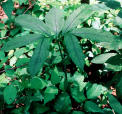 Then the command came for us to "saddle up
and move out." I sat for an extra moment, pondering whether I
should pick the leaf and take it with me as a memento, a reminder of the
devastation of war. I thought about sending it home to my fiance' and
having her press it into a book so that years later I could open it and
touch and smell and ponder some more, hopeful that the answer to my
questions might come with age and wisdom.
Then the command came for us to "saddle up
and move out." I sat for an extra moment, pondering whether I
should pick the leaf and take it with me as a memento, a reminder of the
devastation of war. I thought about sending it home to my fiance' and
having her press it into a book so that years later I could open it and
touch and smell and ponder some more, hopeful that the answer to my
questions might come with age and wisdom.
"Saddle up! Move out!"
I reached for the leaf. My fingers were
poised near the stem. Then they froze. I couldn't pick it.
It belonged here, in a rice paddy in Southeast Asia, not in a book.
Life and death were not mine to pick, only to ponder. I took one
last look at whomever's blood it was that anointed the leaf and realized
that everything recycles. The blood of the dead gives life to
the new.
I stood and placed my helmet
on my head.  Then I saluted the blood-stained leaf. I saluted
the bravery and courage of warriors
Then I saluted the blood-stained leaf. I saluted
the bravery and courage of warriors  fighting
for what they believed, and, at the same time, felt the sadness
and waste that resulted when people's viewpoints differ so much
they are willing to kill one another over their differences.
How sad, I thought, how terribly sad.
fighting
for what they believed, and, at the same time, felt the sadness
and waste that resulted when people's viewpoints differ so much
they are willing to kill one another over their differences.
How sad, I thought, how terribly sad.
When I returned to regimental headquarters, I
wrote a story about the bloody leaf. It was published in our paper.
Its theme was how the earth swallows the signs of war and recycles them
back to life, but leaves in that soil the Courage, Conviction and Bravery
of those who fertilized it with their blood.
. Then I forgot about the bloody leaf. I forgot
about it until this morning when I read about the new body parts being
found.
The story this morning reminder me that Terrorism
is the blood on America's leaf.